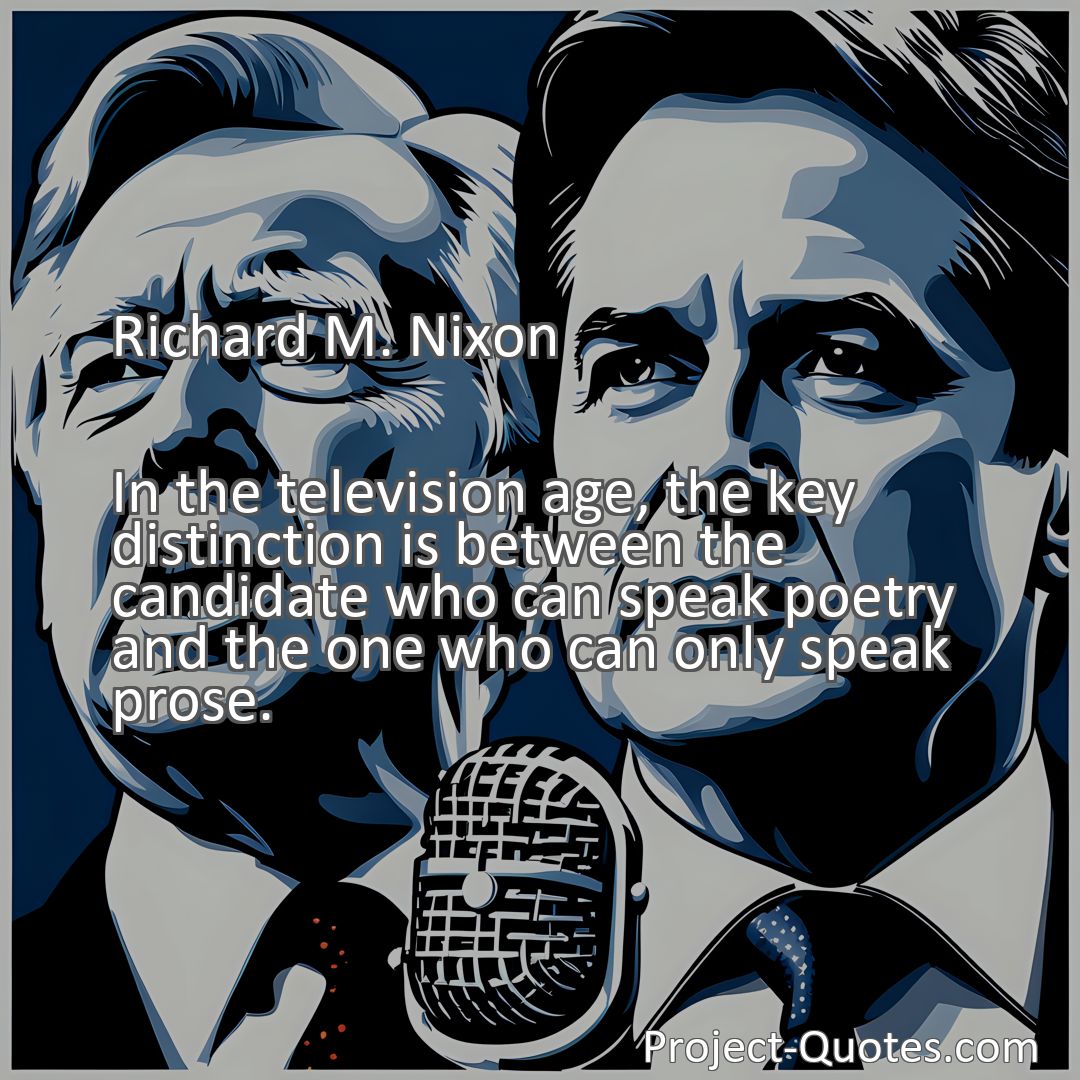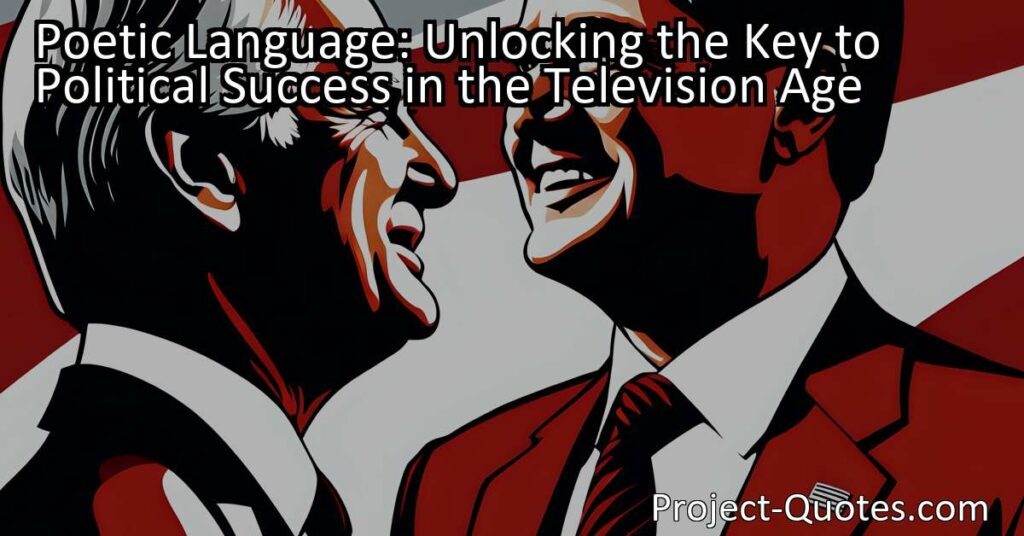In the television age, the key distinction is between the candidate who can speak poetry and the one who can only speak prose.
Richard M. Nixon
Poetic language alone cannot guarantee political success in the television age. While the ability to speak poetry distinguishes candidates and can engage and inspire the audience, it must be supported by integrity, substance, and genuine action in order to truly effect change and ensure long-term success. Ultimately, a combination of captivating language and meaningful action is necessary for political success in the modern era.
Table of Contents
- 1 In the television age, the key distinction is between the candidate who can speak poetry and the one who can only speak prose.
- 2 Richard M. Nixon
- 3 Meaning of Quote – In the television age, the key distinction is between the candidate who can speak poetry and the one who can only speak prose.
- 4 Freely Shareable Quote Image
- 5 Related
Meaning of Quote – In the television age, the key distinction is between the candidate who can speak poetry and the one who can only speak prose.
In the fascinating world of politics, one key distinction often separates the candidates: their ability to captivate the audience through their speech. Richard M. Nixon once said, “In the television age, the key distinction is between the candidate who can speak poetry and the one who can only speak prose.” This poignant quote suggests that in an era dominated by television, an eloquent speaker who can evoke emotions and connect with the viewers through the artistry of language is more likely to succeed in the political arena than one who merely communicates in a straightforward manner.
The television age, which Nixon refers to, revolutionized political campaigns, turning them into televised events. Prior to this era, political speeches were predominantly delivered through print media and public oratory. However, with the advent of television, politicians suddenly gained access to a wider audience and an opportunity to connect with their constituents on a more personal level. This new medium demanded a different kind of communication stylean ability to engage, inspire, and convey complex ideas in a concise and visually appealing manner.
When Nixon speaks of the ability to “speak poetry,” he is referring to the power of rhetoric that goes beyond factual statements. Poetry, in this context, is a metaphor for a politician’s capacity to use language that is vivid, compelling, and capable of evoking deep emotions. It involves utilizing rhetorical devices, such as metaphors, similes, and vivid imagery, to paint a picture in the minds of the listeners, creating a more lasting impact.
In contrast, the phrase “speak prose” implies a more straightforward, factual, and unemotional style of communication. Prose is the ordinary language used in everyday conversations or written works. A candidate who can only speak in prose may have difficulty capturing the attention of the audience and fail to make a lasting impression.
The power of speaking poetry lies in its ability to convey complex ideas, stir emotions, and inspire action. Through the effective use of rhetorical devices, a skilled orator can move an audience to laughter, tears, or even political action. The ability to connect with the listeners on an emotional level is essential for a candidate to cultivate a strong and dedicated following.
To better understand the significance of Nixon’s quote, let’s take a closer look at some memorable political speeches that exemplify the power of poetry in politics. One such example is Martin Luther King Jr.’s iconic “I Have a Dream” speech. Delivered during the historic March on Washington on August 28, 1963, King’s speech remains one of the most influential speeches in American history. Through his eloquence and poetic language, King created a vision of racial equality and justice that resonated with millions of Americans. He used metaphors, repetition, and imagery to paint a vivid picture of his dream, captivating his audience and inspiring them to take action.
Another example that showcases the power of poetic language in politics is President John F. Kennedy’s inaugural address in 1961. In this speech, Kennedy famously proclaimed, “And so, my fellow Americans: ask not what your country can do for you, ask what you can do for your country.” This powerful phrase encapsulated Kennedy’s vision for a more engaged and proactive citizenry, urging Americans to contribute to the betterment of their nation. His use of rhetorical devices, including antithesis and repetition, created a sense of urgency and inspired a generation to actively participate in the civic affairs of the country.
These historical examples illustrate the impact of poetic language on political communication. It is worth noting that the ability to speak poetry does not equate to dishonesty or empty promises. Rather, it is a skill that allows politicians to effectively convey their ideas, values, and aspirations to the public. The ability to articulate complex policies, engage in meaningful discussions, and communicate empathy are all part of the poetic language employed by successful political candidates.
Furthermore, in the television age, where appearances and charisma play a significant role, a candidate’s ability to effectively communicate through poetry can also have an influence on their electoral success. Television, as a medium, relies heavily on visuals and emotional appeal. When a candidate can eloquently express their vision and connect with the viewers through the power of poetry, they can forge a lasting emotional bond with the public.
However, it is important to note that poetic language alone cannot guarantee political success. Substance, integrity, and the ability to enact meaningful change remain crucial factors for candidates as they seek public office. While a captivating speech can capture initial attention, long-term success depends on a candidate’s actions aligning with their poetic promises. The television age may amplify the importance of language and presentation, but ultimately, it is the candidate’s character and ability to deliver on their promises that truly matter.
In conclusion, Richard M. Nixon’s quote provides us with an insightful perspective on the significance of language in politics during the television age. The ability to speak poetry, rather than prose, distinguishes political candidates by their capacity to engage, inspire, and connect with the audience on a personal level. Through the use of vivid imagery, rhetorical devices, and emotional appeal, a skilled orator can leave a lasting impact on the public’s perception and create a pathway to electoral success. However, it is also important to recognize that while poetic language is a powerful tool, it must be supported by integrity, substance, and genuine action to truly effect change.
I hope this quote inspired image brings you hope and peace. Share it with someone who needs it today!


